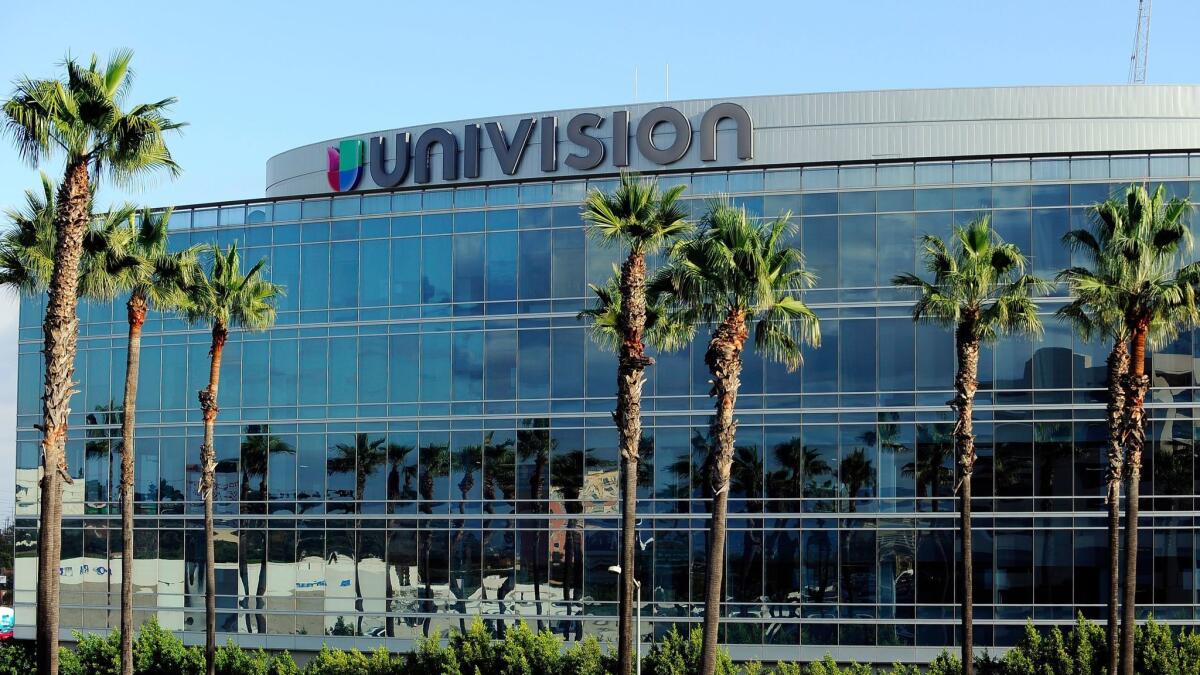Opinion: The Univision blackout isn’t about Latinos’ access to news — it’s about money

The Spanish-language television network Univision is back on cable TV in Los Angeles after a two-day blackout, thanks to a temporary restraining order issued by a judge in New York.
Some consumer advocates argued that the blackout — caused by a contract dispute between Univision and cable TV operator Charter Communications — denied Latinos a news source they depended on to keep track of the developments in Washington that were dramatically affecting their communities. They wanted government to intervene because of, well, Trump.
There’s certainly a whiff of Trump conspiracy theories in the air. Witness this comment by 92-year-old Cypress Park resident Lorenza Muniz after she discovered Univision’s local channel, KMEX, had been blacked out on her Charter Spectrum cable service: “Is this Trump?” The Times quoted her saying to her son. “Is he doing this so Mexicanos don’t get any information?”
The ability to tune in TV signals isn’t an entitlement that government needs to protect somehow.
Local TV stations have long occupied a special place in American society. Their role as a conduit of information was seen as so important, they were granted the exclusive use of extremely valuable airwaves for free. But the ability to tune in those signals isn’t an entitlement that government needs to protect somehow. Television broadcasts are a product, competing with other products and trying to extract the best price from their customers.
There was a time when there were relatively few TV signals available — three major broadcast networks and a handful of local UHF stations — and a limited number of other news sources. (As a writer for a newspaper that went bankrupt not too long ago, I view those days as the Golden Age, and if making America great again meant restoring my industry to its pre-Internet dominance, I would have been all for it.) This is decidedly not that time.
It’s ridiculous to suggest that anyone “depends” or “relies” on Charter’s Univision feed for news. There is one other major Spanish-language network — Telemundo, owned by Comcast’s NBC Universal subsidiary — and at least four independent local Spanish language broadcasters in Southern California. There are plenty of Spanish-language radio stations, two daily Spanish-language newspapers and an assortment of Spanish-language weeklies.
Add to that countless Internet feeds, including Univision’s $6-a-month Univision NOW, as well as at least two satellite-TV alternatives to Charter (AT&T’s DirecTV and Dish), and you’ve got an extremely healthy market for news and information.
It’s not in Univision’s interest to publicize this fact. The more it’s seen as vital or even irreplaceable, the more pressure there will be on Charter to pay higher fees to carry Univision’s stable of TV channels.
That, after all, is the real subject of this dispute, which began when Charter bought Time Warner Cable. Charter and TWC had different contracts with Univision — TWC, which had more customers, had negotiated lower fees. Univision insisted that the merged company negotiate a new deal, but Charter decided simply to pay the fees called for in TWC’s contract. Univision sued and set a Jan. 31 deadline; when the deadline passed without a deal, the network demanded that Charter stop retransmitting the two over-the-air and three cable channels it controls.
They play hardball in the TV business. That’s why blackouts happen across the country every few months; it’s why most Angelenos still can’t watch Dodger games on TV. This case is a little different because it boils down to how existing contracts should be interpreted, which is the kind of thing courts are often asked to resolve. But the core issue, as with every battle between pay-TV operators and networks, is how much the channel’s content is worth.
That’s something the market — that is, TV viewers — should decide, not the government. And if companies like Univision win every one of these disputes, cable bills will just keep going up and up and up. Which is not to say that Univision is wrong in this particular battle; that depends on whether Charter isn’t paying the price it agreed to pay.
The two sides have about a week to work out a deal before the restraining order lifts and the blackout resumes. Consumers shouldn’t stand idly by in the meantime. They can make their feelings known about Univision’s value by calling Charter and threatening to cancel their subscriptions unless it retains Univision — or tuning en masse to other channels.
Twitter: @jcahealey
More to Read
A cure for the common opinion
Get thought-provoking perspectives with our weekly newsletter.
You may occasionally receive promotional content from the Los Angeles Times.











